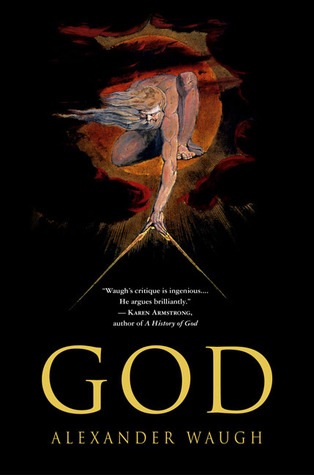

Another in my ongoing series of archival reviews.
I really loved this book. Waugh’s colourful and irreverent romp, through the huge swathes of material – mostly biblical, but going much wider overall in terms of sources, albeit concentrating on the Judaeo-Christian deity – much of which is either bizarrely arcane, pure gibberish, or frequently a mixture of both, is both educational and highly enjoyable.
Not a book likely to be admired by the devout. I was in fact first made aware of it, indeed given it, by a believing friend who themselves refused to read it, for fear it would undermine their faith: exactly why they should read it in my view.
Waugh is a little disingenuous in his intro; by the end of the book – well, long, long before then, in truth – one gets a strong sense that Waugh finds the highly irrational, deeply contradictory, and frequently plain nasty image of the almighty, as glimpsed through his multifarious sources, a very ill-defined (through over-description, rather than any want thereof), nebulous, and on the whole repugnant creation of the human mind.
It is nonetheless remarkable how many of us non-believers feel so drawn to examining what a believer might choose to call our ‘apostasy’. But personally I think that just goes to show how deeply enmeshed in our lives and cultures religion remains, for both those with and without ‘faith’. And I was brought up ‘in the faith’. Or rather within a number of the myriad bastard offspring cults to have proliferated under the name Christian.
And though I might share the desire of many contemporary ‘naturalists and free-thinkers’ (a phrase I got from A. C. Grayling), in wishing to see humanity’s consciousness collectively evolve beyond the religious phase, unlike Dawkins and some others – who at one point seemed to believe such a state was imminent – I think we’re a massively long way from any such state of lucidity or rationality. But then that’s exactly why books like Waugh’s God are so important.
He is at times flippant, and frequently very funny. But underlying it all, and despite the occasional lapse into cheap shots at straw-gods, is a very serious and in my view laudable desire to see, both for oneself and as a society, just who on earth the particularly damnable god of Judaeo-Christian tradition is exactly.
Personally I loved this book and, having gone as far as buying copies for friends, would obviously recommend it to anyone interested in such things.

Interesting comments . As a believer I now want to read it!
Thanks, MD, and glad my review stimulates interest. I’ll chalk that up as a success! I’ve also got, but haven’t read them as yet, Isaac Asimov’s two books, one a-piece on the Old & New Testacles… (sorry!), which are supposed to be very good.